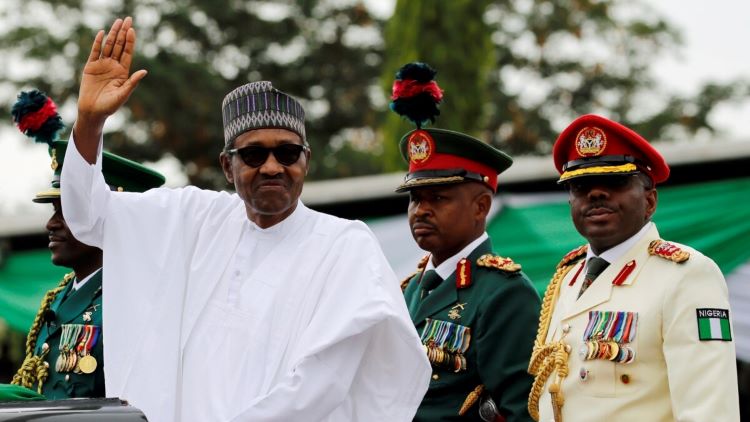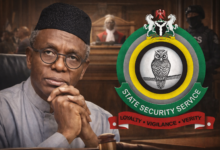How Buhari administration boosted Nigeria’s military capabilities

The Presidency has highlighted the giant strides of President Muhammadu Buhari administration in transforming and boosting the fighting capabilities of the Armed Forces of Nigeria between 2015 and 2023.
The Special Adviser to the President on Media and Publicity, Mr Femi Adesina, in a 90-page document released on Sunday in Abuja, said the remarkable interventions had impacted positively on the capabilities of the military.
In counter-terrorism operations, Adesina said that deaths caused by Boko Haram dropped by 92 per cent from 2,131 in 2015 to 178 in 2021.
He cited a report on Global Terrorism Index 2022, which acknowledged Nigeria’s “successful counter-insurgency operations targeting Boko Haram” as a leading cause of the reduction in terrorism deaths in Sub-Saharan Africa.
Adesina recalled that in May 2022, United Nations Secretary-General, Antonio Guterres also acknowledged the tremendous achievements of the military in the North East.
“Now, the Borno State I have heard about… was a Borno State of terrorism, of violence, of displacement, of despair.
“This is not the Borno that I found today. The Borno I found today is a Borno of hope. It’s a Borno with future…”, he said during a visit to the region.
Adesina also quoted the International Maritime Bureau in its report as saying that Nigeria in 2021 saw the lowest number of piracy attacks on its waters in 27 years.
On the equipping of the military, he said that the Buhari administration had acquired variety of weapons, aircraft and vehicles for the military within the period.
Adesina said the Nigerian Air Force (NAF) received 38 brand new aircraft since President Buhari assumed office in 2015.
They include 10 Super Mushshak; five Mi-35M Helicopters; two Bell 412 Helicopters; four Agusta 109 Helicopters; two Mi-171E Helicopters; 12 A-29 Super Tucano; and three JF-17 Thunder.
According to him, orders have been placed for 36 additional aircraft, comprising 12 AH-1Z Attack Helicopters and 24 M-346 Fighter Attack aircraft for the NAF.
“For the first time in its history, the NAF has, under President Buhari’s administration, successfully conducted several in-country Periodic Depot Maintenance and avionics upgrades of some of its platforms.
“And improved the serviceability status of NAF platforms from about 35 percent in 2015 to over 70 percent as at January 2023.”
Adesina also said the Nigerian Navy had recorded massive transformation within the period with the acquisition of more than 400 new platforms.
“The Nigerian Navy has acquired more than 400 new platforms since 2015, including 200 Riverine Patrol Boats, 114 Rigid- Hull Inflatable Boats, two Seaward Defence Boats, 12 Manta Class/Inshore Patrol Craft.
“Others are, three Whaler Boats, 4 Barges / Tugboats, 22 Fast Attack Boats, 14 Unmanned Aerial Vehicles, four Helicopters, 14 River Town Class, 14 House Boats and four Capital Ships.”
According to him, the Nigerian Army has similarly been transformed into a more efficient well equipped fighting force in the last eight years.
Adesina said apart from doubling yearly intake of troops, there was massive acquisition of equipment, opening of new baes, divisions and commands, and improved welfare of personnel.
“The Nigerian Army has acquired hundreds of new equipment including VT-4 Main Battle Tanks, STI Light Tanks, SH2 and SH5 Artillery Platforms, MRAPs, ARRV and Mine Sweepers, Infantry Fighting Vehicles, Self-Propelled Howitzers, Armored Fighting Vehicles, Mountain Climber Bikes, and many others.
“Most recently, in 2023, the Nigerian Military acquired 700 brand-new Troop-Carrying Vehicles, all assembled in Nigeria,” he said.
On new military formations and bases, the presidential spokesman said that the Navy had established a base in Baga, Borno, and received Presidential approval for new Naval Bases in Lekki, Lagos, Oguta, and Kano in Kano State.
He added that two additional Divisions of the Nigerian Army, 6 and 8 Divisions, were established, to cover new frontiers.
According to him, the Army also established the Cyber Warfare Command, and the Land Forces Simulation Centre in Abuja in 2021 – borne out of an alliance between the Nigerian Army and the National Information Technology Development Agency.
“For the Nigerian Navy, a Naval Doctrine Command was established, while the Nigerian Air Force created a new Special Operations Command and a Ground Training Command.
“The Buhari Administration also established the Defence Research and Development Bureau to harness the Research and Development efforts of the Nigerian Military. Also established, in 2017, was the Defence Space Administration (DSA).
“On Nov. 15, 2022, the DSA oversaw the launch of Nigeria’s first Military Satellite, DELSAT 1, into space.”
He added that the administration “increased recruitment of personnel into the Armed Forces, including a doubling of army recruitment numbers per intake, and a quadrupling of airmen recruitment numbers per intake.”
The presidential spokesman also said there was full operationalisation of the National Counter Terrorism Centre and inauguration of its complex under the President Buhari administration.
He said the launch of Nigeria’s Revised National Counter Terrorism Strategy; National Crisis Management Doctrine and Revised National Defence Policy, were other milestones in the eight years of the administration.
He added that the administration also established Nigeria’s National Centre for the Coordination of Early Warning and Response Mechanism, in 2022, to respond promptly and efficiently to any potential crisis.












